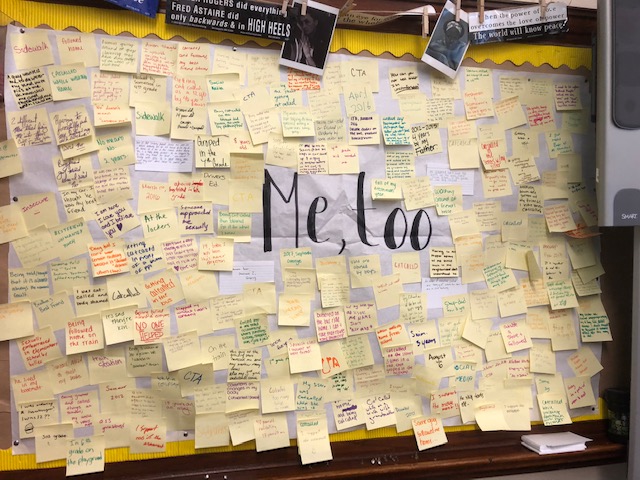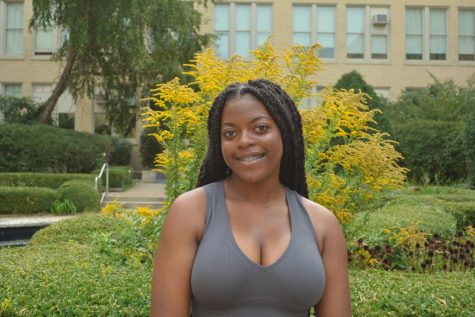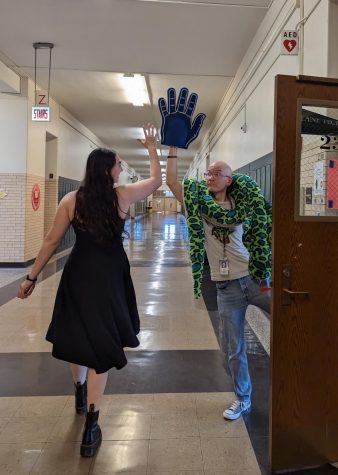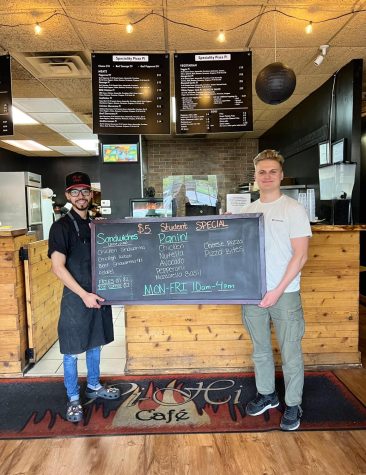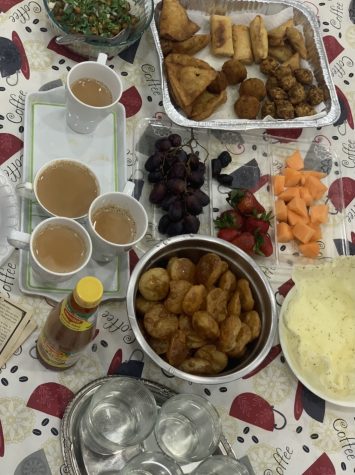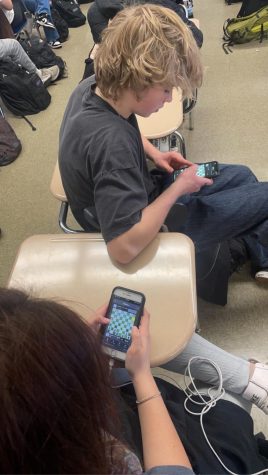English electives representing the underrepresented
Me Too Wall from the Women in Lit Fest of 2018. This wall became part of an assembly about the Me Too Movement later that year. (Photo Courtesy of Courtney Feuer)
January 4, 2021
The English department has over 20 classes, where 13 are electives, and of those electives, five teach students about underrepresented people in literature while giving a voice and outlet to discuss these topics.
The topics of race, identity, gender and more are all taught in Honors Latin American Literature taught by Michelle Vale, Honors Literary Activism taught by Andy Fine, Honors Women in Literature taught by Courtney Feuer, Honors Black Revolutionary Literature taught by April Coleman, and Honors South Asian Literature taught by Sahar Shafqat.
Not only do these classes take a look at underrepresented authors in literature, they also give students the freedom to create their own projects and choose what is taught in class, according to the teachers.
“If it’s Women in Lit or Black Revolutionary Lit, or South Asian Lit or Literary Activism, the students, they pick their own projects, they pick their own topic, they pick their own piece of the puzzle to begin with, and they start to discover their own voice, and who they are and what they can do to change the world for the better,” Literary Activism teacher Andy Fine said.
According to April Coleman, the teacher of Honors Black Revolutionary Literature, these classes are important in covering the depth that students lack and are not restricted to a set lesson plan.
“It does so much for the students because it allows the students to get the depth that they need,” Coleman said. “A lot of our English classes are about ‘let’s cover from here to here,’ and we do it quickly, and we cover it, and you all test well, and we’re like, ‘whoa we got good scores.’ These classes aren’t necessarily focused on that,” she said.
These teachers saw a gap in the English department, which gave them an idea to create these classes while giving voices to students. Sahar Shafqat is the South Asian Literature teacher, and this will be her first year teaching the class.
“We all saw a gap within the curriculum that we teach, and what students aren’t being exposed to that they should be able to engage with and interact with, and I think that’s where it all started,” Shafqat said. “So I saw a gap, and I wanted to fill it with a class that’s emerging in a way that lets students really do a deep dive into their own selves and how they can build a better world for everybody.”
Sadly, these classes are threatened almost every year if they don’t enroll a certain number of students. The teachers have to go in and fight for these students and their classes.
“Ms. Coleman and I had meetings with Ms. Thompson, and with Mr. Tennison each of those years, and we went in together, and we went on our own,” said Courtney Feuer, who teaches Women in Lit. “And we fought, and we said, you cannot cancel these classes, because these classes are really important in our community. You can’t take these voices out of a curriculum, because it is so important to recognize all of the diversity, and all of the important concepts that all of these groups have, LGBTQ and South Asian and African American and women and all the other groups.”
These classes are for everyone, and anyone can take them, according to Feuer.
“The students that we have in our classes aren’t just students from the groups that are the topic of the class,” she said
Taking these classes makes students more aware and open-minded, according to Michelle Vale, Latin American Literature teacher. Students gain perspectives on students who are different from them.
“I do feel like what the classes do is give students more awareness,” Vale said. “That knowing about each other allows us to break barriers, allows us to let more people in, and it allows them to embrace themselves and love themselves. There are places for them to learn about themselves, to learn about each other, and to continue to grow. Not just grow as individuals but grow together as one one Lane Tech community, as one person.”
The voices of Honors Latin American Literature
Last school year, Ms. Vale had a shy group of students. She asked if they were able to use their voices and what they learned throughout the year to speak to the issues that the world is facing today, such as colorism and racism.
“I asked them ….Do you have the confidence and the courage to speak to this, when you need to? And I was inspired by a lot of the stories that they told me about how they’ve talked to their parents, they’ve talked to their aunts, they’ve talked to their uncles, they’ve talked to their cousins” she said.
Students have told Vale that they’ve learned about different viewpoints within their own own race and other races through her class.
“One girl told me, ‘I think when I started this class I spoke from a place of bias. I would say white people think this about us, or, Hispanic people always do this. I now know that I have to listen to other people’s stories to really come up with my own thoughts. I can’t just speak on the generalizations that have been passed down from generation to generation,’” Vale said.
Giving voice to students and letting them become advocates for themselves and others is the main reason classes like these are taught. There is a population at Lane that needs a place for these voices to be heard, according to Vale.
“We have a population of students who don’t typically get a place to express themselves or to dig in within a regular classroom because there’s just so many things that are going on. I feel fortunate that our students have these opportunities to explore.”
The need for Honors South Asian Literature
While she was a student at Lane over 10 years ago, Ms. Shafqat saw a need for a class that celebrated South Asian Literature. She believed that there are voices that you don’t get to hear or read about in the core English classes.
“I wish I had had a class that celebrated voices that I didn’t get a chance to hear very much in other English classes,” she said. “I saw a gap. And I am doing my very best to fill it for our students interested in that area of the world and want to explore the literature and cultures and histories and religions.”
As Shafqat felt there was a need for this class, she wants to be able to teach beyond South Asian writers and focus on other topics concerning the region.
“South Asian literature is about sharing not just South Asian writers, but being able to look at really significant topics like colonial trauma, gender relations and inequality, cross cultural interactions,” she said.
Shafqat said she wishes culture and different places around the world were incorporated into core classes. She took that into consideration to form a class that will allow students to learn more about writers from different cultures from different parts of the world.
“Pakistan, India, Bangladesh, Nepal, Bhutan, Sri Lanka, Afghanistan — all of these places that we don’t get to see a lot of work from in our core classes — and I wish we could incorporate so much more of that,” she said. “But there’s different limitations we’re dealing with. So I saw the opportunity to create a class that lets students engage and work from these kinds of writers and the topics that they’re bringing to the forefront.”
Freedom in Honors Black Revolutionary Literature
Ms. Coleman has changed her curriculum, allowing her and students to have more freedom in the classroom.
“I began to shift from starting with the Middle Passage to ending with the Black Power movement in the 60s and the 70s, and the students themselves began to bring literature and bring rap songs and bring other things to the class. I kinda started jumping all over the place, which is OK because it’s still Black Revolutionary Literature, and then in parentheses culture and art,” she said.
Not only does Coleman allow students to bring up topics that interest them, but she also has her students get involved in the community and other organizations.
“I have assigned a student in Black Revolutionary Lit as a community liaison, and that student’s purpose is to connect to the community, nonprofit organizations, events, to see what’s happening and how we can get involved,” Coleman said.
She also has her students plan their own field trips based on what they bring up in class.
“About a year ago, Curt Maslanka gave me an article on this young, beautiful Black intellectual, Dr. Ewing, a poet from Chicago. So I handed it to my community liaison,” Coleman said. “I gave her the article and she read it and she was like, ‘she’s gonna be in Chicago, with Dr. Roberts, who’s a member of the Little Rock Nine.’ And I said, ‘No kidding.’ She said, ‘Yes, I’m not kidding.’ And so I went to Mrs. Thompson and I said ‘I need a bus,’ And we went to see this incredible speaker.”
The projects of Honors Women in Literature
Ms. Feuer and the Women in Literature class host a Women in Lit Fest during the second semester of school. She allows her students to do a project about anything they want relating to the class.
“Students do a project, and it’s evolved over the years. Now what it is is basically anything you’re interested in or studying that’s related to what we’ve studied for a semester — they can create a project,” Feuer said. “For instance one project this year that was really interesting was about pornography and women who are working in the porn industry, like, what kind of healthcare care do they get like what kinds of social issues are they dealing with because of it.”
The yearly Women in Lit Fest allows students in the class to show what they’ve learned throughout the year to other students about the topics they are passionate about.
“Students come in, they walk around and they interact, and it’s the coolest thing because I watch my students teaching other students and teachers and other adults who come in about the research that they’ve done — and they’re engaging in these amazing conversations, and I look around the room throughout the day and I watch my students just passionately discussing, and other students interacting and engaging,” Feuer said.
Another big project that came from Women in Literature was a “Me Too” wall from the 2018 Women in Lit Fest. Students of the class were able to use their voices and take action.
“We had a ‘Me Too’ wall at the Women in Lit fest. What’s unbelievable was how many students wrote things that had been happening to them in our school, in their communities, just in their lives and students were really blown away by it,” Feuer said. “They wanted to take action. And so this is the coolest thing about our classes is that if we want to do something, we can. We have this flexibility in our curriculum, and so they created an assembly, based on the Me Too wall, and they presented it and 1000 kids were brought by their teachers to this assembly and got to hear these students’ voices and it was all them; I just got the auditorium for them, you know, I was the person who did the paperwork. They had found their voices and their strength to be activists, and they totally did. And that’s something that our classes allow.”
Honors Literary Activism
This is the second year of Honors Literary Activism. According to Mr. Fine, this class takes a look at the greatest leaders, game changers and trailblazers of any time. The class also takes a look at how students themselves can become activists.
“Oftentimes, activism starts, especially for young people, with writing, with art, with words and it’s a really approachable and safe way for young people to speak out about what matters to them,” Fine said.
The class covers a multitude of units to help students learn more about how to find their own voice to speak about topics.
“I have six units, to start with taking action and speaking out so students can learn how they can use their voices in their school, in their community, in their home and in their lives to create positive change. We move onto home, family, and the human condition because again, starting at home and with families, oftentime that’s where the activism begins. People start figuring out who they are and what they believe,” Fine said. “We move onto society, achievement and success; the fourth unit is gender, sexuality and self image; the fifth unit is race, class, and ethnicity; and the sixth unit is health, disability and mental wellness.”
Fine collaborated with Coleman to create the class. She encouraged him to create a class that he’s passionate about, along with giving students the opportunity to use their voice to create positive change.
“That’s how I came up with Literary Activism, because what I’m most passionate about is creating positive change. Using your voice for all different types of people,” Fine said. “The necessity for these classes is exactly to give people a voice and also to encourage us; we all have students that need an opportunity to speak their voice and and there are many students who don’t know how to speak their voice.”
Electives end game
There is an end goal to these electives and what these teachers are trying to teach. According to Feuer, that is for students to find their own voice and to learn more about each other.
“They find their voices, they find their issues, they support each other and also they see each other as this whole human being,” Feuer said. “It’s not just their race or their gender or however they see each other, physically, but they like to understand all of the intricacies that we have as human beings and the ways that we connect to each other based on those things. We need these voices in our schools in order to make it a peaceful place that people walk out of after four years, being ready to be good human beings in the world.

